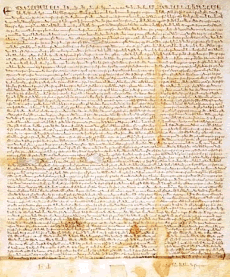|
|
|
|
|
|
|
News & Views item - January 2008 |
![]() Senator Carr Writes of a Coming "Magna Charta" to Give Publicly Funded
Researchers Freedom of Expression. (January 17, 2008)
Senator Carr Writes of a Coming "Magna Charta" to Give Publicly Funded
Researchers Freedom of Expression. (January 17, 2008)
 The
controversy that erupted when the Department of Innovation, Industry, Science
and Research (DIISR) issued its edict1,
2 that media
statements of consequence emanating from publicly funded research institutes,
Cooperative Research Centres and the like must be cleared with the Department
and possibly with the minister, Kim Carr or possibly the Prime Minister, Kevin
Rudd appears to have culminated in initiating some positive action.
The
controversy that erupted when the Department of Innovation, Industry, Science
and Research (DIISR) issued its edict1,
2 that media
statements of consequence emanating from publicly funded research institutes,
Cooperative Research Centres and the like must be cleared with the Department
and possibly with the minister, Kim Carr or possibly the Prime Minister, Kevin
Rudd appears to have culminated in initiating some positive action.
Brendan O'Keefe reports in the January 16 Australian: "Innovation, Industry, Science and Research Minister Kim Carr told the HES he would consult bodies such as the CSIRO on a new charter this year. Yesterday the minister said the controversy was the result of a miscommunication. 'There was some confusion and unfounded speculation, the department made it clear that it was never the intention to gag science or researchers.'" While hardly a mea culpa, the Senator has now (quite possibly after significant consultation with the prime minister's department) set out an agenda in which he will attempt to "identify and guarantee the responsibilities and obligations of each [public research agency through a set of 'charters']". The senator added: "They will enshrine not only the right but the obligation of scientists and other researchers to participate in public research debates."
In an accompanying article titled "Liberating the voices of science", Senator Carr sets out how he intends to develop the "charters" under which institutes and their personnel will be expected to publicly. He opens with : "AUSTRALIANS look to our scientists and researchers to contribute to our economic, social and environmental wellbeing and to expand our horizons of knowledge. This inevitably involves controversial interpretations. It is through the contest of ideas that we expand our understanding."
Below are the most significant excerpts and it is noteworthy that the minister is careful not to make unequivocal commitments of consequence to the researchers.
The Rudd Government looks to its science and research agencies to provide cutting-edge scientific research from which policy can be formulated. The Government recognises that it carries the responsibility for such policy formulation and is accountable to parliament and the people.
Public debate must be as well informed as possible and those who have expertise in the areas under debate must be able to contribute. This means that researchers working in our universities and public research agencies must be - and must be allowed to be - active participants in such debates.
It is not good enough to allow scientists and other researchers to comment on matters of public interest but then to quarantine them from contentious issues. As is often the case, it is in matters of contention and sharp debate that their knowledge and expertise is most valuable. Their right to speak out and to represent their research or discoveries must be protected.
Our public research agencies, by and large, lack any formal recognition of the rights of their research staff to legitimate freedom of expression.
The Rudd Government is committed to creating a charter (akin to that of the ABC)... [which]will identify and guarantee the responsibilities and obligations of each organisation. They will enshrine not only the right, but the obligation, of scientists and other researchers to participate in public research debates.
I will be consulting with public research agencies on developing a policy addressing these issues [to include]:
Encouragement of debate on scientific and other research issues of public interest.
Support for the independence and integrity of public research agencies.
Recognition that the Government remains responsible for the articulation, formulation and implementation of government policy.
Support for the open communication, dissemination of information and debate about the results of scientific, technical and social research.
Recognition that researchers are encouraged to engage in such communication and debate.
It remains now for Senator Carr to lay out the specifics of the "charter" so that researchers and public alike will be able to judge if the Rudd Government will tolerate trenchant criticism let alone pay it heed or even be influenced by it..